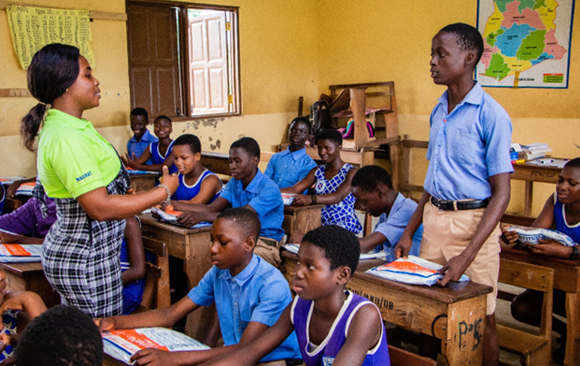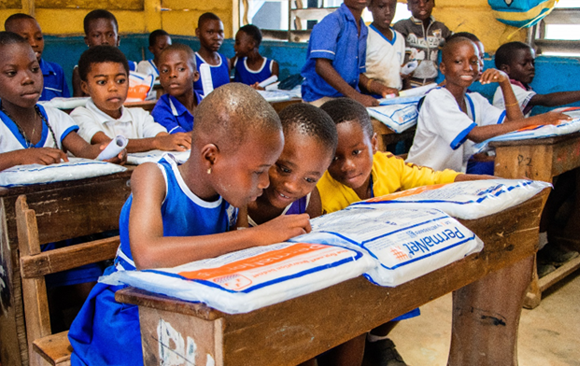By Prince Owusu | Regional ITN Technical Adviser, PMI Evolve Population Services International (PSI)
Ghana

Pupils of Akuse Presby Primary 6 displaying ITNs received during the 2022 schools ITN distribution exercise in Eastern Region, Ghana. Photo credit: Philip Lartey
Since 2012, the National Malaria Elimination Programme (NMEP) in Ghana has implemented school-based insecticide-treated net (ITN) distribution and continues to do so with the School Health Education Programme (SHEP) of the Ministry of Education (GES) as a major stakeholder. PMI VectorLink provides technical assistance to these stakeholders in the planning and implementation of the school-based distribution activities.
Over the years of school-based ITN distribution, primary school pupils have been not only recipients of ITNs for use by themselves and their household members but have also been trained to drive an ITN use and care behaviour change programme in their schools, households and wider communities. The school ITN use and care campaigns are designed to educate individuals about the benefits of ITNs for themselves and their family members and encourage them to use them every night.

A pupil of Akuse Presby Primary 6 responding to a question on ITN use and care during the 2022 schools ITN distribution exercise in Eastern Region, Ghana. Photo credit: Philip Lartey.
Schools are a promising setting for ITN social and behaviour change communication (SBCC) interventions. In Ghana, children spend a significant amount of time in school, enrolment rates are high and schools are therefore ideal places to reach large numbers of children in one place. In addition, children can be effective agents of behaviour change, as they can influence their peers and families. As the adults and leaders of the future, being educated at an early age on sound ITN use and care behaviours gives them a solid grounding for their lives.
School pupils are taught to recognize the mosquito as an enemy that disrupts peaceful sleep and may cause malaria, leading to absenteeism from schools. They are encouraged to sleep under an ITN and pass on the net use and care messages to family members, other pupils and people in the wider community. Messages include sleeping under the net every night of the year, and throughout the whole night, and getting involved in caring for the net by washing, drying and mending it. Additionally, pupils are educated on the effect of malaria on their household’s income and how it is a major cause of absenteeism from school, negatively affecting their education in the short and long term.

Peer-to-peer behaviour change at work. Pupils of Chorkor Presby Primary School discuss ITN use and care messages. Photo credit: Philip Lartey.
In implementing the SBCC programme, schools develop action plans for malaria education in their institution and communities using a template and an ITN use and care guide. They discuss malaria and its effects on individuals and communities during school assembly, class sessions, parent association meetings and community outreach.
Sierra Leone
Currently PMI VectorLink is providing technical assistance to the Sierra Leone National Malaria Control Programme (NMCP) in planning and implementing the pilot of a school-based ITN distribution in Kono district. Targeting pupils in primary years 1, 3 and 5, just over 100,000 ITNs will be distributed in April 2023 with a robust SBCC campaign to promote correct ITN use, care and repair behaviours. To promote sustainability in health education and ensure partnership between schools and community health facilities, staff of Peripheral Health Units (PHUs) will be involved in distributing ITNs and educating pupils and teachers on their use and care. The NMCP and partners are also engaging village chiefs, community and opinion leaders and other stakeholders to promote ITN use and care in their communities.
Issues to consider
There are some challenges in using schoolchildren as ITN use and care SBCC agents. Children may not always have access to the resources and support they need to effectively promote the use of ITNs. Additionally, they may face resistance from their peers and families, who may be sceptical about new health behaviours. In general, however, the evidence suggests that the benefits outweigh the risks[1].
In conclusion
Schoolchildren have the potential to be effective agents of behaviour change in promoting the use of ITNs. By educating children about the benefits of ITNs and encouraging them to promote their use to their peers and families, school-based ITN SBC interventions can help to reduce the burden of malaria at the household, community, district and country level and help achieve the government’s vision of malaria elimination.
[1] https://malariajournal.biomedcentral.com/articles/10.1186/s12936-020-03401-7
